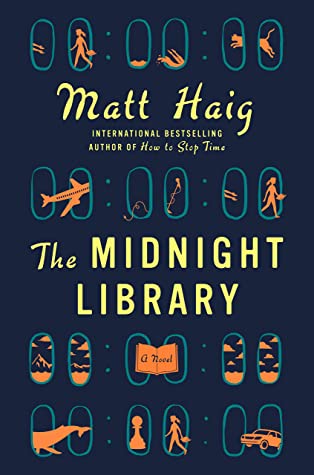- The Good: Great concept of parallel universes through an unending library
- The Bad: Safe; full of platitudes
- The Literary: Nearly every chapter is a different reality
Nora Seed decides to commit suicide, but moments before the pills take effect, she is transported to a library. The shelves go on forever, and every book is a story of a life an alternate version of her is living. Nora has many regrets, and now she has the chance to experience the lives she might have had if she had made different choices. Thankfully, Nora’s school librarian is there to help her sort through all the books and options and to ask the question, what are the makings of a successful life?
I really like the idea of the library that exists between life and death, as a tool for exploration of the meaning of life. The first section of the story focuses on Nora learning the rules of her library and exploring lives of missed opportunities. Nora stays with her long-term boyfriend, and they open a bar in a small town; Nora follows her love of music and becomes an internationally famous rock star; Nora lives her father’s dream for her when she sticks with swimming and competes in the Olympics; Nora moves to Australia with her best friend; Nora studies to be a glaciologist and lives in the desolate Arctic Circle. But for one reason or another, Nora is unhappy with each of those lives, mostly because a family member or friend is dead.
Nora soon realizes that living other lives, where she doesn’t make the same mistakes, isn’t the solution. Most of her choices weren’t the direct cause of her relationship with her brother or the fact that she didn’t major in philosophy in college. She lives many lives, all with good and bad, ups and downs. Halfway through the story, she finds another “traveler”, someone else who is also moving through all his alternate lives. After a few chapters of conversation, they part ways and that door of plot possibility is shut.
I find the growth of Nora and the order of the lives she visits quite deftly handled from a storytelling perspective. I love the never-ending library of Nora’s own creation. I like the Thoreau quotes and the conversations about string theory.
My cynical side thinks this is a book for people who have big regrets in their lives, to make themselves feel better by convincing themselves they’d be just as unhappy in other lives for different reasons. So, if you struggle with or are often frustrated by your career choice, partner, or children, this is an emotional story about appreciating what you have and making a choice to be better every day. On the other hand, if you struggle with depression, I’m not sure this book is a good option. It’s especially triggering for suicide, and it may suggest that if you just try harder to be happy, you’ll be better.
I wish this book had more of a magical fantasy library or a scifi alternate dimensions plot, or even a deep dive into the philosophy of a meaningful life. There is a little bit of each of these things, but mostly, this story is platitudes and pep talks.
Recommended for contemporary literary fiction fans looking for a heart-warming journey of life-acceptance.
